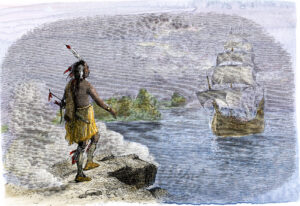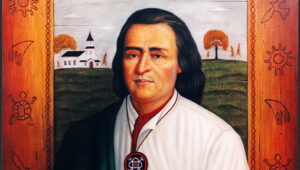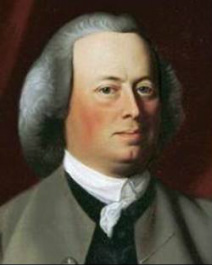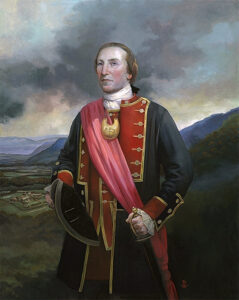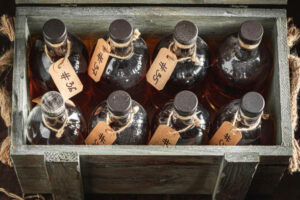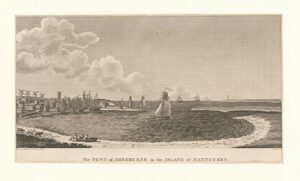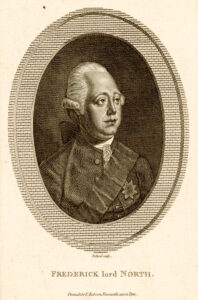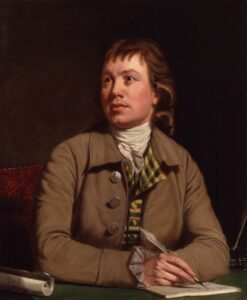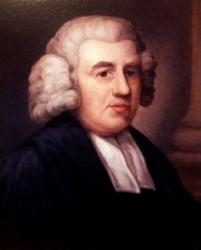Americanism Redux
March 14, your today, on the journey to the American Founding, 250 years ago, in 1774
A public problem has grown into a public crisis.
Some people are part of pushing and driving the growth. Others resist and seek its undoing. Still others rush to stand apart and build a wall against whatever is coming.
And life rolls ahead, over stones and rocks in the river. It’s 250 years ago, today.
* * * * * * *
More tea leaves float in Boston harbor. Uh, sink, to be truthful. Vanish, if you insist on being bone-hard accurate about it. That’s what happened in the SECOND event of tea-dumping—yes, second—which occurred last week but is only now being reported in a handful of Boston newspapers. Sixty protestors, dressed as Native warriors and yelling the war-whoop, had seized thirty chests of tea aboard the British ship “Fortune” anchored in the harbor, forced the chests open, and pour the dried tea into the saltwater. These disguised Natives have gone the whole way—the tea is it, the crux of all protest, the ultimate in depicting and expressing colonial rights.
A curious thing, don’t you think? In addition to tea as their issue, protestors across Massachusetts, Connecticut, New Hampshire, and New York have turned to Native American life for their symbols. It’s become the personal style of northern protestors: feathers tied to hair, streaks of paint on faces, hatchets and tomahawks tucked into belts, voices shrieking in high pitch and staccato pace, Mohawks and Narragansetts in names. These are their choices at this moment of their boldest, strongest, and most aggressive resistance in the past few years. It’s a new feature in the strain of tensions that has existed for the past ten years.
The decisions of style are made together, in small groups, with quick nods and darting looks of consensus and agreement, aimed more at a target than a goal. But why this and why now?
A style of protest has grown along the track from problem to crisis.
* * * * * * *
(Samson Occum)
Samson Occum is a Native from the Moheagan tribe in the colony of Connecticut. He’s in a good mood today, 250 years ago. A Christian evangelist and close friend of black poet Phillis Wheatley, Occum is optimistic after letters and talks with friends and acquaintances familiar with Oneida Natives living near Niagara in the St. Lawrence River valley. The interactions convince Occum that the Oneida tribe will agree to accept emigrants from tribes in eastern New England who have converted to Christianity. Occum has helped convert these newly Christianized Natives and he’s hoping they’ll be safe among Native non-believers. He is especially persuaded by the knowledge that William Johnson, an ultra-connected and wealthy British landowner and Native intermediary in the colony of New York, has pledged his support of the emigrants. Occum learns that Johnson has sent a letter to other “Western tribes” threatening retaliation if the emigrants are harmed. Occum relishes today’s optimism after his recent bout of doubt and uncertainty over the matter.
But things about Johnson have changed and Occum the optimist doesn’t know it.
Occum’s wall has died.
* * * * * * *
(Paul, author of the Scriptural text)
Today, 250 years ago, forty-nine men and women from the Pequot and Narragansett tribes near Stonington, colony of Connecticut, listen to a Christian sermon from a preacher in the pulpit. They hear about the Biblical text of: “For with the heart man believes unto righteousness; and with the mouth confession is made unto salvation (Romans 10:10).” Heart to mouth. Belief to confession. Sin to salvation.
Soon, eight pence will jingle in the pocket of Joseph Fish, his payment for today’s sermon from a public-private evangelizing fund in England.
The wall has a window of stained glass.
* * * * * * *
(James Warren)
Another passage of the Bible has captivated the mind of James Warren in Plymouth, colony of Massachusetts and the one-time home of the preacher Joseph Fish. Warren is one of the most influential leaders of colonial rights and a firm supporter of the adoption of Native culture in the style of protesting. His wife, the writer and poet Mercy Otis Warren, has recently published in a newspaper her praise of the Native style.
Warren’s latest bit of Scriptural reading is this: “…every city or house divided against itself shall not stand (Matthew 12:25).”
The passage practically screams at Warren for its relevance in today’s growth of problem into crisis. The walls inside a house can divide as well as separate.
* * * * * * *
(John Wentworth)
John Wentworth has issued a public call for the walls to come down and the roof to come off.
He is the royal governor of the colony of New Hampshire and a few days ago, under authority of his British imperially-appointed office and position as the colony’s chief executive, Wentworth announces that in one month will be “a day of prayer and fasting to implore God to be merciful in the health and harvest of the colony and in protection of the king [George III] and his family.” Look heavenward, Wentworth proclaims, and prosperity shall shower upon us as a united people in our blessed system.
Reverse the resistance, stop the growth of problem to crisis, and gain again a happiness once known.
* * * * * * *
(the relationship they hold in common, Washington)
Two Scotsmen, two men between 30 and 50 years old, two connections to the same man called George Washington.
Today, one of them is a newly-minted lieutenant colonel in the military organized by the colony of Virginia and its royal Governor, Lord Dunmore. He is William Fleming, a judge and former army doctor in Botetourt County. Fleming had served under the command of Colonel George Washington in the French and Indian War. That service shifted his sights toward the interior and away from the coast.
Today, the other of them is William Webster, whose labor has just been acquired by Washington for seven years of indentured servitude. Washington signs the papers that made him the owner of Webster’s labor. That signature locked his hands onto the work expected by another.
Webster is fresh off the boat from Scotland while Fleming has been in the New World for twenty years.
Lt. Col. Fleming looks west to the Ohio River valley and lands he has been promised for his military service. Servant Webster looks west, east, north, and south for the fastest route of escape from Washington’s control. With luck and another sunrise, he’ll be gone.
A single person, an individual, calculates life and makes a choice between problem and opportunity, crisis and break-out.
* * * * * * *
Martin Hemmings, enslaved, is today, 250 year ago, living on the plantation of Thomas Jefferson, Monticello. A tense relationship exists between Hemmings and Jefferson. Not long ago, Jefferson had purchased one of his favorite creatures from Hemmings, a mockingbird. Possibly reflecting a level of trust created by the transaction, Hemmings has received a promotion of sorts—he is now Jefferson’s butler, traveling with him to various locations and in close proximity to Jefferson’s wife, Martha. Hemmings doesn’t know that Jefferson holds a secret suspicion of his butler. Jefferson has begun to monitor the whereabouts of fifty-eight bottles of Jamaica rum recently acquired “in order to try the fidelity of Martin.”
A testing is meant to reveal the state of a problem before the source of a crisis. The test-maker possesses the power, and the test-taker copes the best he can.
* * * * * * *
(near the demolished lighthouse)
Walk the island’s rocky beach. See a heap of planks and boards, splintered and broken. It used to be a light house. Pick up strips of wood that were a barn and a shed. Watch the tide and surf come and go and you’ll see the remains floating on the surface of the saltwater. Out to sea.
All it took was a minute. Sixty seconds of a tornado that appeared out of nowhere off Nantucket at slightly after dawn. Boom—the wind blasted apart the light house and flattened the smaller wooden buildings. Then it was gone. Folks here agree that maybe another quarter-hour and the destruction on Nantucket Island, colony of Massachusetts would have been far worse.
The storm hadn’t grown from bad to worse. It simply disappeared. No one knew why. Regardless, everyone was thankful.
A few people are out there today on the beach, picking up the pieces, thinking about the problem of re-build rather than the crisis of burial.
Also
(North makes his first proposal)
In London, today, 250 years ago, British Prime Minister Lord North makes his announcement to the British House of Commons and House of Lords, the Parliament. North proposes that Parliament consider and approve the formal closing of the port of Boston in the colony of Massachusetts. This proposal will be in response to the tea protests held in the town last December. This proposal may also not be the complete response of the imperial government. It is simply the first proposal on the subject.
North’s proposal has implications. Boston is the source of trouble, the spot of emphasis. To close the port of Boston is to place the British military, especially the navy, in firm control of events as directed by the British government. Cutting off this major artery of commerce, travel, information, and much else is to sweep everyone into the sack for punishment. Nowhere is an attempt to address grievances.
Let politicians commence the debate. There’s a new mark on the road of growth from problem to crisis.
* * * * * * *
(William Woodfall)
Also in London, William Woodfall is starting a new media publication. He wants to call it “The London Packet.” It will have a specialization: printing “a variety of facts, sentiments, and arguments respecting the right of taxing the Colonies, (that) would reach the public eye, which it is not likely to see otherwise.” In addition, Woodfall states that the “Packet” will give “people without doors to judge, with some degree of certainty, of the necessity and rectitude of the conduct of our Senators within.” In other words, the governed will be better informed about the doings of the governing. Woodfall is eager to have colonial rights leaders write columns and essays that represent their ideas and views of events. He’s hopeful they’ll send written material to the “Packet” in England.
Would their material help or hurt the growth-road of problem and crisis?
* * * * * * *
(Yemelyan Pugachev)
Other newspapers in London are now printing official reports from the Russian imperial government about the state of the Pugachev Rebellion. Catherine the Great and her ring of advisors, supporters, and supplicants do everything they can to suppress all information about the uprising, either inside or outside Russia. Some British readers believe that peasants in Russia have little to no understanding of the world outside a one-mile radius of their shelters.
Whether in its absence or presence, information will affect the growth of problem to crisis.
* * * * * * *
(John Newton)
In England, John Newton writes to a widow about her grief over the death of her husband. A former slave-trader who now has confessed his role in human trafficking, Newton is the author of the lyrics called “Amazing Grace. His letter to the widow carries the same aroma of surrender to a love that forgives, sustains, inspires, and encourages. Newton compares the widow’s tears to Jesus’s tears at the death of his friend Lazurus. Never forget, Newton writes in closing, that you are remembered and supported by all of us. Newton’s empathy is much richer now that he’s changed his ways and left behind his slave-trading past.
It is a future of growth out of problem and crisis.
For You Now
(a space between)
A space exists between something being a problem and something becoming a crisis. Crossing through that space is a set—a bunch?—of actions, mindsets, assumptions, decisions, and a dozen other things. They belong to individuals and people. They combine together and bounce off one another to worsen the problem, to narrow or obstruct its resolution, to travel to the border on the other side of the space where a sign reads “Crisis.”
As an American in mid-March 2024, you’re in that space right now, between problem and crisis. Take note of what you see and don’t see. Take time and make an effort to verify. Stay connected to other people without surrendering your own gifts, abilities, and experiences. Expect your vision to blur and clear, re-blur and re-clear; don’t get overly confident with the clarity or overly despondent with the blur. Use your hands as well as your feet—your feet to keep moving and to steady yourself when still, your hands to grip and hold, to shape and pack. Internally, know your fountain of direction: for the spiritual, it might be upward, for the self-interested, it might be outward.
You may be a driver, you may be a resister, you may be a wall-builder. Whichever describes you, understand that perhaps the biggest stakes in play have to do with co-operation and co-existence. Behave accordingly.
Above all, if you’re a leader, you might need to chat. Reach out to me and we’ll do so. You’re in the space.
Suggestion
(Your River)
Take a moment to consider: are you ready for the appearance of a sudden, new factor between now and the border between spring and summer?

